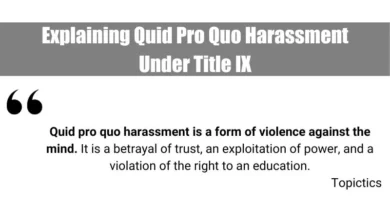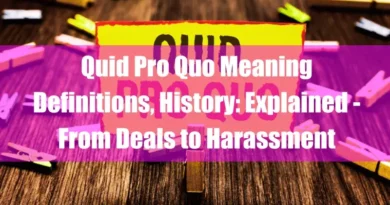Understanding Quid Pro Quo Harassment in Relationships
Takeaways
| Key Points |
|---|
| Quid pro quo harassment is a form of abuse where sexual favors are coerced in exchange for something of value, occurring in both romantic and non-romantic relationships through financial coercion, emotional manipulation, and social control. |
| In romantic relationships, perpetrators may exploit their financial means, social status, or emotional influence, leading to devastating consequences such as emotional distress, physical harm, and erosion of trust. |
| Similarly, in non-romantic relationships, harassment can manifest through parental coercion, sibling abuse, or workplace exploitation, where authority figures use their power to demand sexual compliance. |
| The underlying factors contributing to this abuse include individual traits like narcissism and entitlement, relational dynamics such as rigid gender roles and hierarchical structures, and societal influences that normalize sexual coercion and silence victims. |
| Addressing quid pro quo harassment requires education, prevention, and systemic change to support victims and dismantle power imbalances that enable this form of exploitation. |
Introduction
Quid pro quo harassment is a form of abuse in which sexual favors are coerced in exchange for something of value. This abuse can occur in various relationships, including romantic partnerships, family bonds, and professional settings. Perpetrators exploit power imbalances to extract sexual favors from victims, causing emotional distress, physical harm, and disruption of personal and professional lives.
This pervasive form of abuse affects individuals across all demographics, highlighting the need for education, prevention, and support for victims. Let’s explore the complexities of Quid Pro Quo Harassment in Relationships.
Quid Pro Quo Harassment in Romantic Relationships
A. Diverse Forms of Quid Pro Quo Harassment in Romantic Partnerships
Quid pro quo harassment in romantic relationships can manifest in various forms, often veiled in subtle manipulation and emotional control. The perpetrator may leverage their financial means, social status, or even the emotional bond of the relationship to extract sexual favors.
- Financial coercion: The perpetrator may threaten to withhold financial support or material benefits, such as money, property, or gifts, in exchange for sexual compliance.
- Emotional manipulation: The perpetrator may exploit the victim’s emotional needs and vulnerabilities, offering love, attention, or affection in exchange for sexual favors.
- Social control: The perpetrator may isolate the victim from their social support network, threatening to expose their secrets or damage their reputation if they refuse sexual advances.
B. Real-Life Scenarios of Quid Pro Quo Harassment in Romantic Relationships
- A partner offers to pay for their significant other’s expensive lifestyle in exchange for sexual favors.
- A partner threatens to break up with their significant other if they don’t engage in sexual activities they are uncomfortable with.
- A partner manipulates their significant other’s self-esteem, making them feel unworthy of love and affection unless they comply with their sexual demands.
C. Devastating Impact of Quid Pro Quo Harassment on Victims in Romantic Relationships
Victims of quid pro quo harassment in romantic relationships often experience a range of negative consequences that can have a profound impact on their emotional, physical, and psychological well-being.
- Emotional distress: Victims may grapple with feelings of guilt, shame, and self-blame, leading to anxiety, depression, and post-traumatic stress disorder (PTSD).
- Physical harm: In some cases, quid pro quo harassment can escalate to physical abuse, leaving victims with injuries and further trauma.
- Erosion of trust and self-esteem: The coercive nature of quid pro quo harassment erodes the foundations of trust and respect in a relationship, leaving victims feeling vulnerable and insecure.
D. Underlying Factors Contributing to Quid Pro Quo Harassment in Romantic Relationships
Individual, relational, and societal factors can contribute to quid pro quo harassment in romantic relationships.
- Individual factors: Perpetrators may exhibit traits of narcissism, entitlement, or a lack of empathy, making them more likely to engage in manipulative and exploitative behaviors.
- Relational factors: Rigid gender roles and traditional power dynamics can create an environment where one partner feels entitled to the other’s body and desires.
- Societal factors: A culture of normalization of sexual coercion and a lack of open communication about healthy relationships can perpetuate the prevalence of quid pro quo harassment.
Quid Pro Quo Harassment in Non-Romantic Relationships
A. Manifestations of Quid Pro Quo Harassment in Non-Romantic Relationships
Quid pro quo harassment can manifest in various forms within non-romantic relationships, including family bonds, friendships, and even professional settings.
- Parental coercion: Parents may exploit their authority to demand sexual favors from their children, threatening to withhold affection, financial support, or even parental rights if they refuse.
- Sibling abuse: Older siblings may coerce younger siblings into sexual activities, leveraging their physical or emotional power to maintain control.
- Workplace abuse: Supervisors or colleagues may exploit their position of power to extract sexual favors from subordinates, threatening job security or advancement if they refuse.
B. Examples of Quid Pro Quo Harassment in Non-Romantic Relationships
Quid pro quo harassment can manifest in various forms within non-romantic relationships, including family bonds and friendships. Here are some examples to illustrate the diverse ways in which this form of abuse can occur:
- Parental Coercion: A parent threatens to withhold financial support or affection if their child does not comply with sexual demands.
- Sibling Manipulation: An older sibling coerces a younger sibling into sexual activities by threatening to reveal their secrets.
- Parental Authority Abuse: A parent leverages their control over household privileges or allowances to demand sexual favors from their child.
- Friendship Exploitation: A friend insists on sexual favors in exchange for maintaining the friendship or keeping confidences.
- Family Power Imbalance: An extended family member uses their influence or control over family matters to pressure another family member into sexual acts.
- Parental Emotional Manipulation: A parent emotionally blackmails their child into sexual compliance by threatening to withdraw love and care.
C. Factors Fostering Quid Pro Quo Harassment in Non-Romantic Relationships
Individual, relational, and societal factors can contribute to quid pro quo harassment in non-romantic settings. Understanding these factors is crucial for preventing and addressing this form of abuse.
1. Individual Factors:
Perpetrators may exhibit traits of narcissism, a sense of entitlement, or a lack of empathy, making them more likely to engage in manipulative and exploitative behaviors. They may also have a distorted view of power dynamics and relationships, believing that they are entitled to sexual favors in exchange for their position or influence.
2. Relational Factors:
Unequal power dynamics, such as hierarchical structures in families, institutions, or workplaces, can create opportunities for exploitation. Age gaps, positions of authority, and financial dependence can make individuals more vulnerable to coercion.
3. Societal Factors:
A culture of silence and normalization of sexual coercion can prevent victims from speaking out and seeking help. This culture can be perpetuated by societal norms emphasizing the importance of silence, the fear of victim blaming, and the lack of clear and accessible reporting mechanisms.
Prevention Strategies
A. Understanding the Lack of Legal Protection
Quid pro quo harassment in personal relationships, whether familial or romantic, lacks specific legal safeguards under federal laws like Title IX and Title VII. These laws are tailored to workplace and educational settings, leaving a gap for those facing harassment in personal contexts.
B. Practical Strategies for Prevention and Support
- Recognizing Power Dynamics: Identifying power imbalances in personal relationships is crucial. Understanding these dynamics helps in preventing coercive and manipulative behavior.
- Establishing and Communicating Boundaries: Setting clear boundaries and discussing them openly helps maintain mutual respect in relationships. Both parties should feel comfortable asserting their limits.
- Domestic Violence Hotlines: Services such as the National Domestic Violence Hotline (1-800-799-7233) offer confidential support for individuals experiencing harassment.
- Counseling Services: Professional counseling can provide a safe space to address and navigate relational issues.
- Community Resources: Local support groups and shelters offer resources and advice for those in need.
- Engaging in Mediation or Counseling: Professional mediation or counseling can help address power imbalances, provide a neutral environment to resolve conflicts, and prevent harassment.
- Empowering Self-Advocacy: Empowering individuals to stand up for their rights includes educating them about personal boundaries, rights, and the importance of seeking help when needed.
- Fostering a Culture of Respect: Building a culture of mutual respect and equality in personal relationships helps prevent the development of quid pro quo harassment. This includes promoting open communication, addressing power disparities, and supporting each other in maintaining healthy boundaries.
Conclusion
Quid pro quo harassment is a form of abuse that can have devastating consequences for victims, eroding their emotional well-being, damaging relationships, and undermining their sense of safety and security. Addressing this issue requires a comprehensive approach that involves prevention, education, empowerment, and accountability.
The urgency to address quid pro quo harassment cannot be overstated. It is a pervasive issue that impacts individuals in various relationships, perpetuating a culture of silence and exploitation. We must collectively take action to prevent this form of abuse, empower victims, and foster a society where respect, equality, and consent are the cornerstones of interactions.
Our shared vision for the future is a world where quid pro quo harassment is eradicated, and individuals feel safe, respected, and empowered to assert their rights. It is a world where healthy relationships are nurtured, open communication is the norm, and power is balanced and used responsibly. We must strive towards this vision, working together to create a society where everyone is valued, protected, and empowered.
FAQ
What is “Quid Pro Quo” in the context of personal relationships?
“Quid Pro Quo” is a Latin term meaning “something for something.” In personal relationships, it refers to situations where one individual demands sexual favors or other intimate acts in exchange for benefits, affection, or avoidance of negative consequences.
Can you explain “Sexual Coercion” within intimate relationships?
“Sexual Coercion” involves pressuring or manipulating a partner into sexual activity without their consent. This can include threats, guilt-tripping, or offering rewards, creating a dynamic where the coerced partner feels obligated to comply.
What does “Emotional Blackmail” mean in the context of quid pro quo harassment?
“Emotional Blackmail” is a form of manipulation where an individual uses threats, guilt, or fear to control another person’s behavior. In relationships, this can manifest as demanding sexual favors in exchange for maintaining the relationship or avoiding emotional harm.
Define “Power Imbalance” and its role in personal relationship harassment.
“Power Imbalance” occurs when one partner holds more influence or control over the other, whether through financial means, social status, or emotional dominance. This disparity can facilitate quid pro quo harassment, as the dominant partner may leverage their position to extract favors.
What is “Consent,” and how does it relate to quid pro quo situations?
“Consent” refers to an affirmative, conscious, and voluntary agreement to engage in specific activities. In quid pro quo scenarios, true consent is compromised, as one partner feels pressured to agree due to promised benefits or threats.
Explain the term “Manipulative Conditioning” in relationships.
“Manipulative Conditioning” involves systematically influencing a partner’s behavior by associating certain actions with rewards or punishments. For instance, offering affection only when the partner complies with specific demands constitutes manipulative conditioning.
What does “Transactional Sex” mean within a personal relationship?
“Transactional Sex” refers to engaging in sexual activities with a partner primarily to receive material benefits, favors, or other advantages rather than for mutual affection or desire.
Define “Boundary Violation” in the context of intimate relationships.
A “Boundary Violation” occurs when one partner disregards the personal limits set by the other, pressuring them into uncomfortable or unwanted activities, including sexual acts exchanged for favors.
What is “Psychological Manipulation,” and how is it used in quid pro quo harassment?
“Psychological Manipulation” involves tactics employed to influence another’s thoughts or behaviors for personal gain. In quid pro quo harassment, this can mean making a partner feel obligated to provide sexual favors to receive love, support, or other benefits.
Explain the concept of “Conditional Affection” in relationships.
“Conditional Affection” is when one partner offers love, attention, or support only when the other meets specific demands or expectations, such as engaging in unwanted sexual activities.
What does “Sexual Opportunism” mean in the context of personal relationships?
“Sexual Opportunism” refers to taking advantage of situations to obtain sexual favors, often disregarding the other person’s willingness or consent. In relationships, this can involve exploiting a partner’s vulnerabilities to fulfill one’s own desires.
Define “Emotional Dependency” and its relevance to quid pro quo harassment.
“Emotional Dependency” is a state where one partner relies heavily on the other for emotional support and validation. This dependency can be exploited in quid pro quo harassment, with the dominant partner demanding favors in exchange for emotional sustenance.
What is “Intimate Partner Exploitation”?
“Intimate Partner Exploitation” involves taking unfair advantage of one’s romantic partner for personal gain, which can include coercing them into unwanted activities by leveraging the intimate nature of the relationship.
Explain “Sexual Bartering” within a personal relationship.
“Sexual Bartering” is the act of negotiating sexual activities in exchange for goods, services, or other benefits within a relationship, often leading to an imbalance and potential exploitation.
What does “Coercive Control” mean in the dynamics of personal relationships?
“Coercive Control” is a pattern of behavior where one partner seeks to dominate the other through manipulation, intimidation, or threats, often restricting their freedom and autonomy. This control can manifest as quid pro quo harassment, where coercion extracts compliance.










Comments are closed.